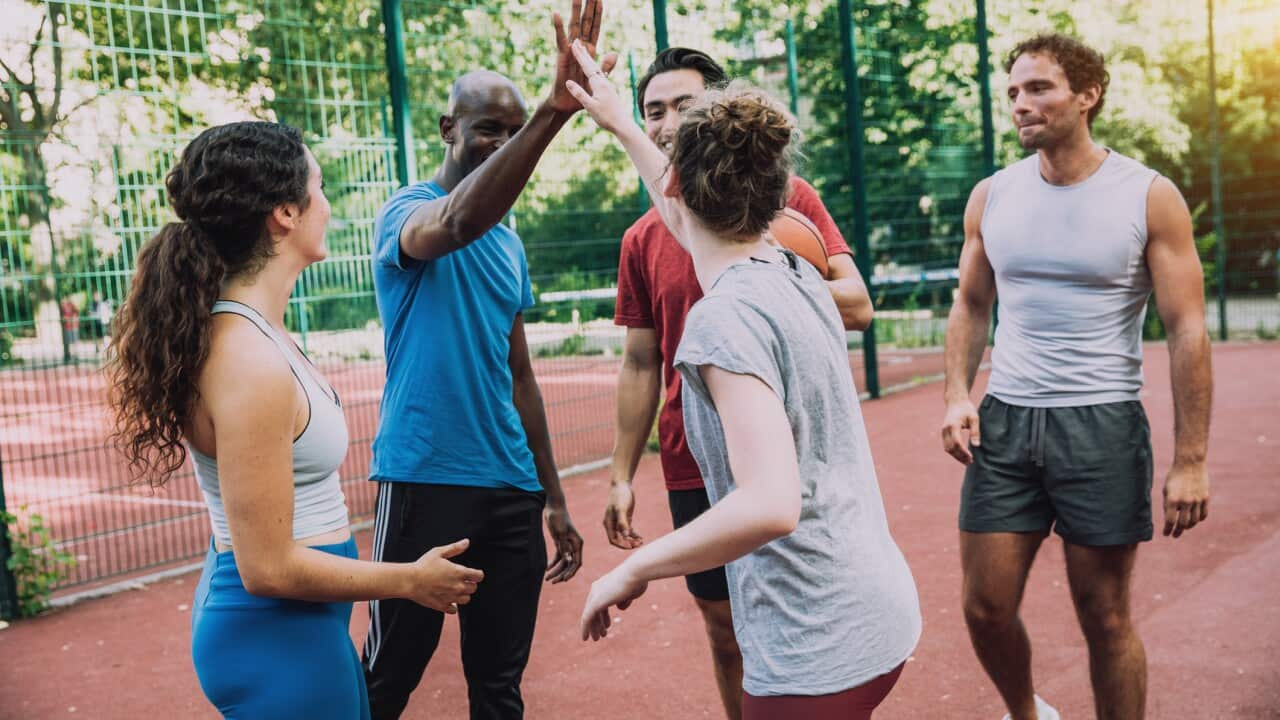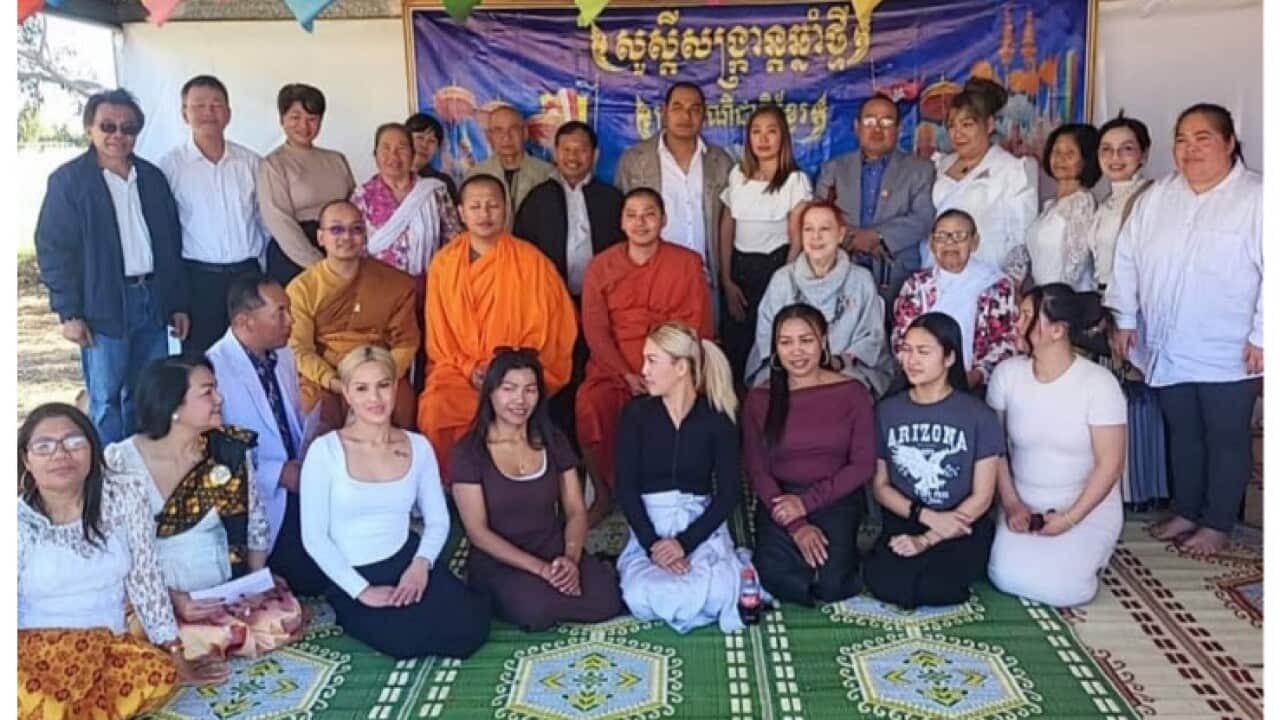This lesson is suitable for intermediate-level learners. After listening, test your knowledge with our quiz.
Learning notes
Different phrases to use when talking about which team sport is the best for you:
- I'm keen to do something a bit more social as well. Maybe join a team sport?
- What d’ya reckon?
- Let me help get the ball rolling for you.
- I'm worried they’re a bit hard core and take the game too seriously.
- I should probably join a team that's a bit more 'cas'.
- It’s more about making friends than winning.
Learning focus:
In spoken English, we tend to use short forms of words. Sometimes these are slang forms that we would usually only use in informal contexts, like:
‘Cas’ for casual when Allan says, ‘I should probably join a team that's a bit more 'cas'.’
‘Aggro’ when Gloria says, ‘People who are a bit hard core about their sport can sometimes take it to an extreme and become 'aggro'.’
But we use the shortened forms of common verbs (like ‘be’ and ‘do’) and pronouns (like I and it) etc. All the time when we speak - even in very formal contexts - because this simply makes them easier to say, like:
Gloria: I’d never played futsal or football before IN MY LIFE. (I + had = I’d)
Allan: I'm keen (I + am + I’m)
Claire: It’s more about making friends (It + is = It’s)
We use this kind of shortening wherever we are and whoever we are talking to, but we usually write the full form (in this case, I had, I am and It is).
Colloquial expressions:
To be like a fish out of water means to feel awkward or unhappy because you are in a situation where you do not feel comfortable or at home.
To get the ball rolling is to begin doing something.
What d’ya reckon is an informal way of asking if someone agrees with you.
To be hard core means to take something seriously.
Cas is short for the word casual and means informal and not too serious.
Aggro is short for the word aggressive, which means very angry and possibly violent.
To bring my 'A' game means to do my absolute best.
Vocabulary:
To be keen to do something is to be very interested in doing it.
Camaraderie means the closeness, trust and friendship that develops among a group of people who have gone through some kind of experience together.
Transcript:
(Note: This is not a word-for-word transcript)
SBS acknowledges the Traditional Custodians of Country and their connections and continuous care for the skies, lands and waterways throughout Australia.
Hi everyone, I am Gloria. Nice to meet you all again!
'RUN! DEFENCE! PRESSURE, PRESSURE! LEFT!' These are the words my teammates screamed, as I was running around the field playing my first game of futsal.
Have you heard of this game? It’s a type of soccer where you only have 5 players on each team, and you play on a much smaller pitch. All I remember about my first time playing, was being out of breath and trying to touch the ball with my foot. I must have been OK because we won! Then we went to the pub afterwards for a celebratory drink. Now we are unbeatable!
To be honest, I’d never played futsal or football before IN MY LIFE. I am more of a dancing person really. But back then I was like a fish out of water – I'd just started working at SBS, and everything was a bit new and scary, so when the opportunity to play team sports with my new colleagues came along, I thought to myself, why not?
If you’re like a 'fish out of water', that means that you feel that you feel awkward and that you don’t belong. For everyone new to Australia, maybe at some time you have experienced this feeling.
So playing a team sport was a good chance to make some friends and get to know everyone. And for me it worked! Although I’m not sure I’m exactly a futsal star yet! Anyway, today, let’s practise talking about choosing a team sport that’s right for you!
Allan and Claire met at an IT company when they first came to Australia. Now they work in different companies but still occasionally catch up. Allan wants to do something more social.
Listen to how he describes the different sports teams. Can you guess which team he will join?
Claire
Hey Allan! How’s the new job going for ya?
Allan
The work is fine but I'm keen to do something a bit more social as well. Maybe join a team sport? What d’ya reckon?
Claire
I think it's a great idea. Hmmm....let me help get the ball rolling for you... ok, what type of sport are you interested in?
Allan
Well... there's a work soccer team... but I'm worried they’re a bit hard core and take the game seriously.
Claire
Yeah, sounds a little intense. What level of commitment are you looking for?
Allan
Well, of course I’d want to bring my 'A' game, but I've got to be realistic about what I can actually do, so I should probably join a team that's a bit more 'cas'.
Claire
I get it. It’s more about making friends than winning, right?
Allan
Yeah! That’s right!
YAY! It’s all about the sense of camaraderie Allan, you can get from playing together! I get it too! That’s exactly the warm and friendly feeling I had when I started playing with the SBS futsal team.
You can 'get a feeling' but you can also say you ‘get something’ if you understand what someone is saying.
'Camaraderie' is the closeness, trust and friendship that develops among a group of people who have gone through some kind of experience together. It is common in sports teams and can also happen at work if everyone plays well together and works as a team.
Okay but let’s get back to Claire from the beginning,
Claire started by greeting Allan with a ‘hey’. Sometimes this is used instead of ‘hi’.
Then Allan said,
The work is fine but I'm keen to do something a bit more social as well. Maybe join a team sport? What d’ya reckon?
If you are ‘keen’, then you are very interested in something and want to do it.
‘What d’ya reckon’ is an informal way of asking if someone agrees with you.
Claire said,
Hmmm... let me help get the ball rolling for you... ok, what type of sport are you interested in?
To 'get the ball rolling' means to start doing something because if you roll a ball downhill, it just keeps rolling, and even gets faster. So Claire means let’s start the process of trying to figure out what sports Allan should join.
Allan then replied,
Well... there's a work soccer team... but I'm worried they’re a bit hard core and take the game too seriously.
‘To be hard core’ means to take something seriously. Allan said,
Well, of course I’d want to bring my 'A' game, but I've got to be realistic about what I can actually do, so I should probably join a team that's a bit more 'cas'.
To ‘Bring your ‘A’ game’ means to bring your best to whatever you are doing.
I believe there’s a balance in everything. We can bring our A game without necessarily being too ‘hard core’ about it, that is without taking it too seriously. As Allan says, you can still do your very best in a team that is a bit more 'cas'.
‘Cas’ is short for the word casual, which means informal. In this case it means relaxed and not too serious. You can also use ‘cas’ to describe a lot of different things… your attitude to life, to work or even to love!
People who are a bit hard core about their sport can sometimes take it to an extreme and become ‘aggro’.
‘Aggro’ is short for the word aggressive, which means very angry and possibly violent. And Allan isn’t interested in joining that kind of team because, as Claire says:
I get it! It’s more about making friends than winning, right?
ABSOLUTELY, RIGHT!
Claire gets it. She understands what he means, and so do I. I think life is too short to take things too seriously. But what about you? What type of team suits you?
Now that we've had a look at some words and phrases we can use to talk about which team sport is the best for you to join, let's listen to the dialogue again.
A big thank you to our educational consultant, Professor Lynda Yates, and our guest David.
Paul Nicholson and Lily O'Sullivan voiced the characters of Allan and Claire. Micky Grossman did the sound design.





